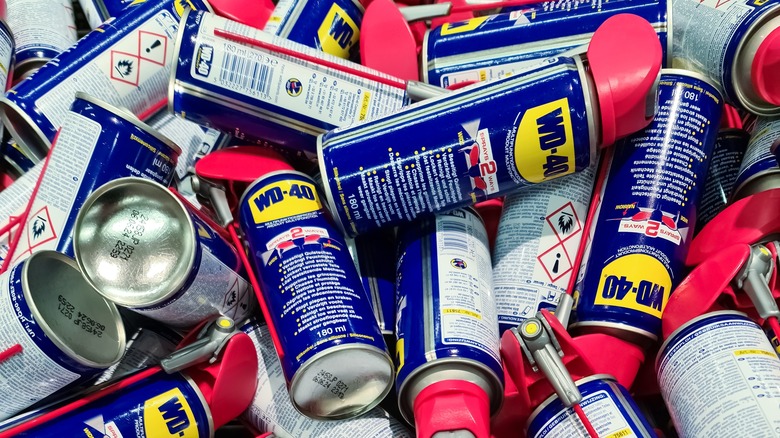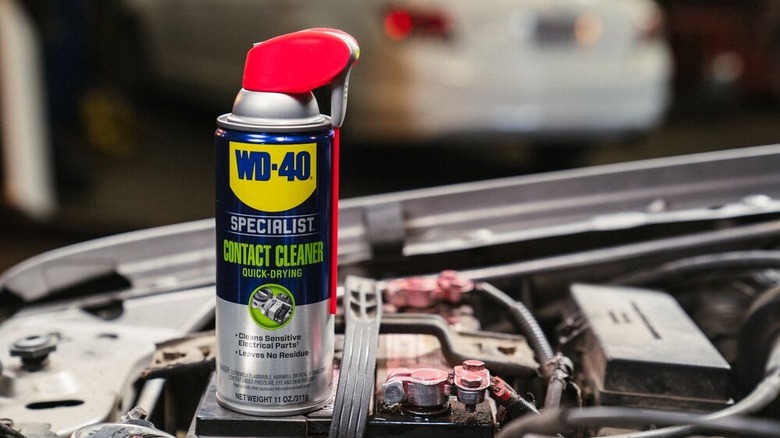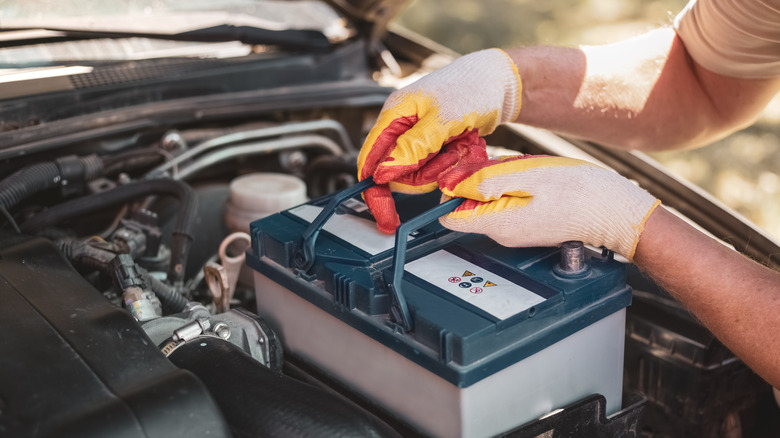Does WD-40 Prevent Battery Corrosion? What You Need To Know
We may receive a commission on purchases made from links.
If you don't already have WD-40 in your garage, you're probably missing out. While there are plenty of things you shouldn't be doing with WD-40 like using it on your car brakes or instruments that you breathe through, it has a lot of practical uses that definitely make up for it. For example, you can use it to loosen fasteners, get rid of the annoying squeaky sounds from your door hinges, clean your electronics, and of course, maintain your car battery.
These days, there are multiple variations of WD-40 with different formulations designed and tested for specific functions, including battling car battery corrosion. So while WD-40 can help manage the effects of corrosion, you need to get the right one that has been tested for use with vehicle batteries to prevent unexpected issues or further damage. In the past, we've talked about the difference between the WD-40 Contact Cleaner and the WD-40 Electric Parts Cleaner, with one made more for automotive needs while the other more for consumer technology that has more sensitive components. So if you're looking for the right WD-40 for use with your car battery, you need WD-40 Specialist Contact Cleaner.
According to WD-40, its Specialist Contact Cleaner Spray can be used to remove most common contaminants and is safe for different rubber, metal, and certain plastic surfaces. But does it actually prevent battery corrosion? Here's what we know.
How you can use WD-40 Specialist Contact Cleaner
The many reasons your car battery keeps dying include corroded terminals, which limit the flow of electricity. Once undercharging happens often enough, it can do a number on your battery's overall health. But even with normal use, car batteries are prone to corrosive buildup, which can appear in colors such as brown, blue, or green. So it's in your best interest to remove the corrosion before it causes any problems.
You can use WD-40 Specialist Contact Cleaner to clean your battery's terminals and keep it in working order. To avoid skin reactions, WD-40 suggests using a wire brush to scrub away the buildup and a cloth to wipe it off. Afterward, don't forget to wash your hands to avoid accidentally tasting it. In its Material Safety Data Sheet, WD-40 says its effects when inhaled or ingested can include drowsiness, dizziness, and even death. As a general rule, then, it's best to spray it only in well-ventilated areas and avoid using it near open flames, as it's super flammable and prone to combustion.
Along with battery terminals, WD-40 can be used for other car maintenance needs, such as cleaning tools, plus removing silicone grease and motor oil. On Amazon, you can buy 11 oz. WD-40 Specialist Contact Cleaner Spray for only $8.99 — certainly cheaper than the cost of replacing a ruined battery.
Tips for maintaining your car batteries
When making sure your car batteries last better for longer, keeping corrosion at bay is only part of the equation. Other factors that affect battery health include your driving habits, the weather, and traffic conditions. Some of these things are beyond your realm of control, and as with other types of batteries, the ones in your vehicle will naturally degrade with regular use and time.
However, there are still a few things you can do to make sure that your car batteries have a shot at a longer life, such as keeping up with maintenance schedules, avoiding extreme temperatures, and not unnecessarily draining the battery. Owners of hybrid or electric cars also have to consider specialized care, like optimal charging periods, the right kind of charger, and how to store the car properly for extended periods.
If you're new to car ownership and haven't had the dreaded dead-battery experience just yet, one key symptom when your battery is on its last legs is when it doesn't sound right (or at all) during startup. And if you start to see other alarming things under the hood, like battery swelling or leaking, you may want to just go ahead and change it, or ask a professional to do it for you.


